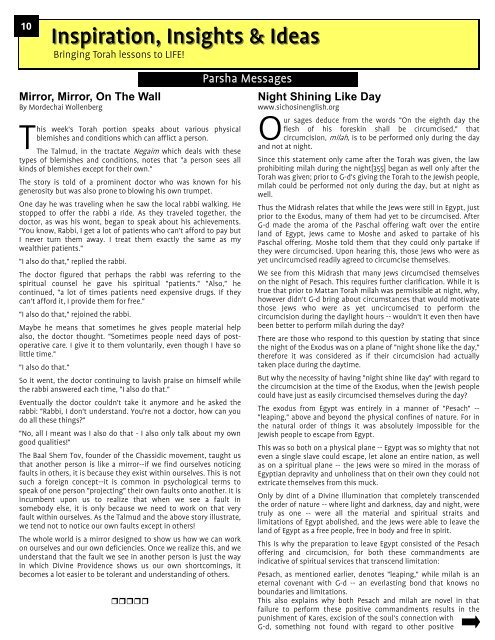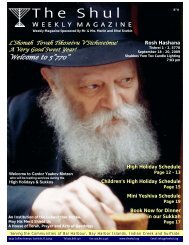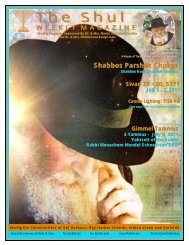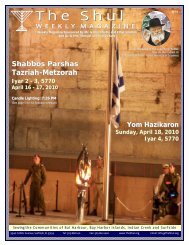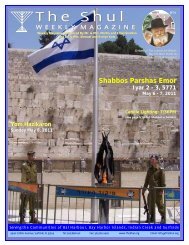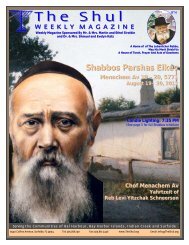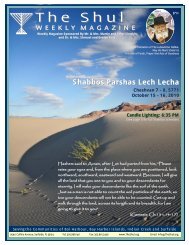Create successful ePaper yourself
Turn your PDF publications into a flip-book with our unique Google optimized e-Paper software.
10<br />
Mirror, Mirror, On The Wall<br />
By Mordechai Wollenberg<br />
T<br />
his week's Torah portion speaks about various physical<br />
blemishes and conditions which can afflict a person.<br />
The Talmud, in the tractate Negaim which deals with these<br />
types of blemishes and conditions, notes that "a person sees all<br />
kinds of blemishes except for their own."<br />
The story is told of a prominent doctor who was known for his<br />
generosity but was also prone to blowing his own trumpet.<br />
One day he was traveling when he saw the local rabbi walking. He<br />
stopped to offer the rabbi a ride. As they traveled together, the<br />
doctor, as was his wont, began to speak about his achievements.<br />
"You know, Rabbi, I get a lot of patients who can't afford to pay but<br />
I never turn them away. I treat them exactly the same as my<br />
wealthier patients."<br />
"I also do that," replied the rabbi.<br />
The doctor figured that perhaps the rabbi was referring to the<br />
spiritual counsel he gave his spiritual "patients." "Also," he<br />
continued, "a lot of times patients need expensive drugs. If they<br />
can't afford it, I provide them for free."<br />
"I also do that," rejoined the rabbi.<br />
Maybe he means that sometimes he gives people material help<br />
also, the doctor thought. "Sometimes people need days of postoperative<br />
care. I give it to them voluntarily, even though I have so<br />
little time."<br />
"I also do that."<br />
Inspiration, Insights & Ideas<br />
Bringing Torah lessons to LIFE!<br />
So it went, the doctor continuing to lavish praise on himself while<br />
the rabbi answered each time, "I also do that."<br />
Eventually the doctor couldn't take it anymore and he asked the<br />
rabbi: "Rabbi, I don't understand. You're not a doctor, how can you<br />
do all these things?"<br />
"No, all I meant was I also do that - I also only talk about my own<br />
good qualities!"<br />
The Baal Shem Tov, founder of the Chassidic movement, taught us<br />
that another person is like a mirror--if we find ourselves noticing<br />
faults in others, it is because they exist within ourselves. This is not<br />
such a foreign concept--it is common in psychological terms to<br />
speak of one person "projecting" their own faults onto another. It is<br />
incumbent upon us to realize that when we see a fault in<br />
somebody else, it is only because we need to work on that very<br />
fault within ourselves. As the Talmud and the above story illustrate,<br />
we tend not to notice our own faults except in others!<br />
The whole world is a mirror designed to show us how we can work<br />
on ourselves and our own deficiencies. Once we realize this, and we<br />
understand that the fault we see in another person is just the way<br />
in which Divine Providence shows us our own shortcomings, it<br />
becomes a lot easier to be tolerant and understanding of others.<br />
<br />
Parsha Messages<br />
Night Shining Like Day<br />
www.sichosinenglish.org<br />
O ur<br />
sages deduce from the words "On the eighth day the<br />
flesh of his foreskin shall be circumcised," that<br />
circumcision, milah, is to be performed only during the day<br />
and not at night.<br />
Since this statement only came after the Torah was given, the law<br />
prohibiting milah during the night[355] began as well only after the<br />
Torah was given; prior to G-d's giving the Torah to the Jewish people,<br />
milah could be performed not only during the day, but at night as<br />
well.<br />
Thus the Midrash relates that while the Jews were still in Egypt, just<br />
prior to the Exodus, many of them had yet to be circumcised. After<br />
G-d made the aroma of the Paschal offering waft over the entire<br />
land of Egypt, Jews came to Moshe and asked to partake of his<br />
Paschal offering. Moshe told them that they could only partake if<br />
they were circumcised. Upon hearing this, those Jews who were as<br />
yet uncircumcised readily agreed to circumcise themselves.<br />
We see from this Midrash that many Jews circumcised themselves<br />
on the night of Pesach. This requires further clarification. While it is<br />
true that prior to Mattan Torah milah was permissible at night, why,<br />
however didn't G-d bring about circumstances that would motivate<br />
those Jews who were as yet uncircumcised to perform the<br />
circumcision during the daylight hours -- wouldn't it even then have<br />
been better to perform milah during the day?<br />
There are those who respond to this question by stating that since<br />
the night of the Exodus was on a plane of "night shone like the day,"<br />
therefore it was considered as if their circumcision had actually<br />
taken place during the daytime.<br />
But why the necessity of having "night shine like day" with regard to<br />
the circumcision at the time of the Exodus, when the Jewish people<br />
could have just as easily circumcised themselves during the day?<br />
The exodus from Egypt was entirely in a manner of "Pesach" --<br />
"leaping," above and beyond the physical confines of nature. For in<br />
the natural order of things it was absolutely impossible for the<br />
Jewish people to escape from Egypt.<br />
This was so both on a physical plane -- Egypt was so mighty that not<br />
even a single slave could escape, let alone an entire nation, as well<br />
as on a spiritual plane -- the Jews were so mired in the morass of<br />
Egyptian depravity and unholiness that on their own they could not<br />
extricate themselves from this muck.<br />
Only by dint of a Divine illumination that completely transcended<br />
the order of nature -- where light and darkness, day and night, were<br />
truly as one -- were all the material and spiritual straits and<br />
limitations of Egypt abolished, and the Jews were able to leave the<br />
land of Egypt as a free people, free in body and free in spirit.<br />
This is why the preparation to leave Egypt consisted of the Pesach<br />
offering and circumcision, for both these commandments are<br />
indicative of spiritual services that transcend limitation:<br />
Pesach, as mentioned earlier, denotes "leaping," while milah is an<br />
eternal covenant with G-d -- an everlasting bond that knows no<br />
boundaries and limitations.<br />
This also explains why both Pesach and milah are novel in that<br />
failure to perform these positive commandments results in the<br />
punishment of Kares, excision of the soul's connection with<br />
G-d, something not found with regard to other positive


